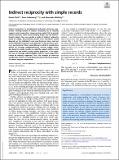Indirect reciprocity with simple records
Author(s)
Clark, Daniel; Fudenberg, Drew; Wolitzky, Alexander Greenberg
DownloadPublished version (881.4Kb)
Publisher Policy
Publisher Policy
Article is made available in accordance with the publisher's policy and may be subject to US copyright law. Please refer to the publisher's site for terms of use.
Terms of use
Metadata
Show full item recordAbstract
Indirect reciprocity is a foundational mechanism of human cooperation. Existing models of indirect reciprocity fail to robustly support social cooperation: Image-scoring models fail to provide robust incentives, while social-standing models are not informationally robust. Here we provide a model of indirect reciprocity based on simple, decentralized records: Each individual's record depends on the individual's own past behavior alone, and not on the individual's partners' past behavior or their partners' partners' past behavior. When social dilemmas exhibit a coordination motive (or strategic complementarity), tolerant trigger strategies based on simple records can robustly support positive social cooperation and exhibit strong stability properties. In the opposite case of strategic substitutability, positive social cooperation cannot be robustly supported. Thus, the strength of short-run coordination motives in social dilemmas determines the prospects for robust long-run cooperation.
Date issued
2020-05Department
Massachusetts Institute of Technology. Department of EconomicsJournal
Proceedings of the National Academy of Sciences of the United States of America
Publisher
Proceedings of the National Academy of Sciences
Citation
Clark, Daniel et al. “Indirect reciprocity with simple records.” Proceedings of the National Academy of Sciences of the United States of America, 117, 21 (May 2020): 11344-11349 © 2020 The Author(s)
Version: Final published version
ISSN
0027-8424